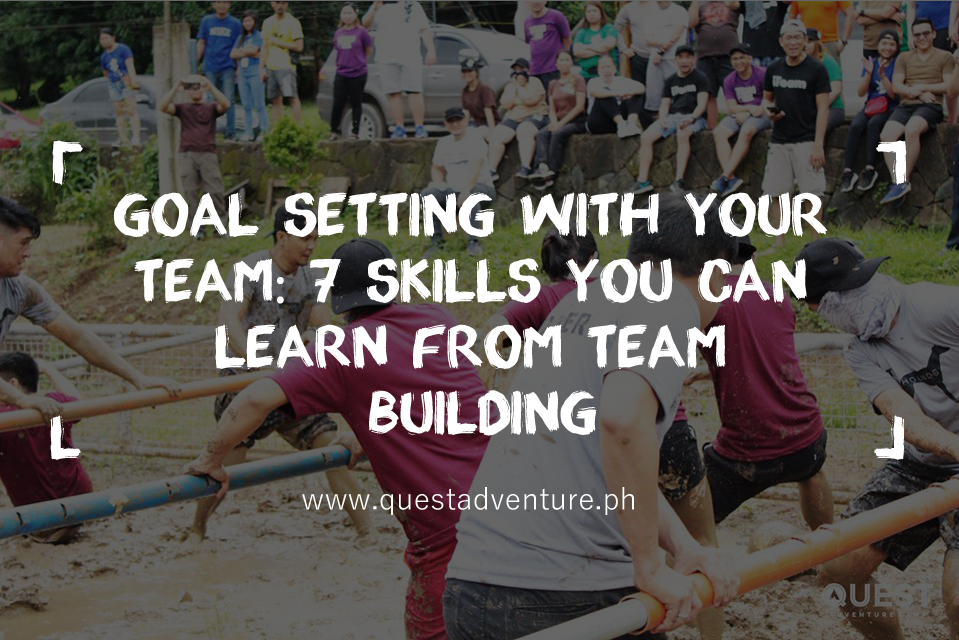
Goal Setting With Your Team: 7 Skills You can Learn From Team Building
When a group works well with each other, it can lead to better results. In fact, setting specific goals could lead to better performance.
But to succeed, there should be an alignment between those of the individual, team, and organization.
Everyone in the team should be focused on working towards a common outcome and understand how their work could be able to contribute to the bigger picture. That’s where goal setting comes in.
In this post, we’ll talk more about goal setting, as well as the skills that you and your team could learn from team building:
Creating a Mission Statement
One of the best team building exercises that you could do is to start communicating your mission statement clearly and consistently.
Your focus should be on the following best practices:
- Clear and simple: The mission statement that you create should be easy to understand.
- Authentic: It should reflect what your business does, as well as the changes that you need to make. Every day, it should be mirrored to the actions of your team.
- Obvious: Place this mission statement as a reminder to everyone, especially about the “why” behind their daily work.
- Bold: It should showcase your company’s personality and culture.
Tracking Key Metrics
Setting metrics is important for the team, as well as for each of the members.
Everyone should be transparent on how their efforts are contributing to the team’s overall goals.
That way, you can boost performance, as well as look for ways to have a significant impact. You also need to know whether or not your efforts are sticking to your goals.
Hence, you need to track these key metrics.
Prioritizing Tactics
You and your team might come up with different tactics to achieve your goals.
But to create a team that’s focused on reaching these goals, you need to know how to prioritize activities. That way, you can ensure that everything is on the right track.
Try out various frameworks until you find something that best fits your team. From there, you can make necessary adjustments as you figure out how to streamline your processes best.
Taking Action
Some people might become too focused on the outcome that they fail to plan the steps that are needed along the way.
By creating an action plan and writing down every individual step, you’ll find yourself crossing each one as you complete it. Doing so allows you to see whether you are making progress or if you’re right on schedule.
This is especially true if your goal is large, demanding, or set in the long-term.
Managing Your Time
When setting goals, time management is equally important.
Often, time management is required to complete or accomplish a goal. If you do not consider the timescale needed to achieve a goal, then you’re bound to fail.
Apart from that, the time that you allocate in goal setting and planning directly impacts your performance. The more time that you spend on the planning stage, the more likely you’ll succeed.
Focusing on the Goal
The more mini-goals that you need to achieve, the more that you would need focus. It allows you to sit down as you brainstorm ideas.
Focusing on a goal can be tough. That’s why learning this skill is important, especially with a team.
Setting Your Mindset
Another important skill that teams and individuals must learn is to set a goal mindset. Think about the goals you and your team need to achieve, as well as how you can achieve it.
For instance, when one lacks the motivation to pursue that goal, think about why you have it in the first place.
Again, knowing the why behind all your efforts is great in the long run, especially for abstract goals. Furthermore, questions should be asked, like:
- Why are the reasons we have this goal?
- What is the purpose?
- How will everyone benefit from it?
If a goal already has a looming deadline, and you don’t know how to be able to move forward, you need to think about the particular actions that you need to take.
In short, you need to take one step at a time.
Final Thoughts
Keep in mind that goal setting is an ongoing effort, not just a means to an end. It’s more than just saying that you want something to happen.
Unless you define clearly what you want to achieve in the first place and how you can do it, the odds of reaching your goal are relatively low.
You and your team should have constant reminders to be able to keep yourselves on track. You also need to have regular time slots to allow you to review your goals.
The end destination might remain similar in the long run, but the action plan you’ve set for yourself and your team might change significantly along the way.
You can organize team building activities, for instance, to make sure that necessity, relevance, and value remain high. That said, you might want to check out Quest Adventure Camp’s team building packages that can suit your needs.








No Comments
Sorry, the comment form is closed at this time.